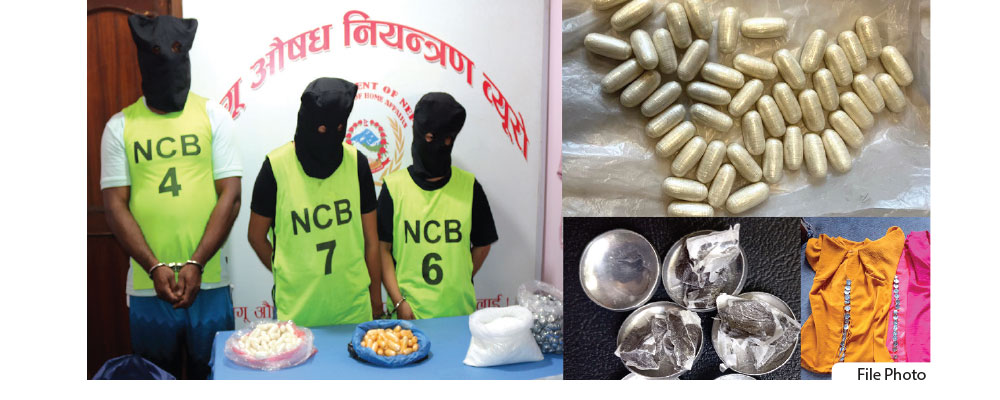
Kathmandu, June 26: If the government data is anything to go by, then it is sure that the number of illicit drug users in Nepal is increasing by 5.06 per cent every year taking the total users to an estimated 156,821 as of mid-April, 2024.
According to Nepal Drug Users' Survey-2020, the third survey of its kind published by the Ministry of Home Affairs, the total drug users in Nepal were actually at 130,424, in 2020, which is the increment rate of 5.06 per cent annually. On June 26, the world marks the International Day Against Drug Abuse and Illicit Trafficking with a theme "The evidence is clear: invest in prevention."
The same record of drug users survey conducted by the Ministry in 2012 showed that there were 91,534 drug users in Nepal, and 46,309 in 2006. But when compared with the drug users' data survey of 2012 and 2006, it showed that drug users in Nepal increased by 11.36 per cent.
Among 130,424 drugs users, 121,692 (93.3 per cent) are male and 8,732 (6.7 per cent) female.
"If we have to rely on the recently conducted survey of drugs users in Nepal, the actual drug users in Nepal are 130,424 but when we have to assume 5.06 per cent of annual increment from 2020, it might have reached 156,821 in 2024 of mid-April," according to Basanta Raj Kunwar, executive director of Narconon Nepal, an organisation working on drug rehabilitation programme, and former SSP, who served Nepal Police for 20 years.
"The abuse of illegal substances has been one of the major problems faced by Nepal for last four decades," said Kunwar.
As per the survey report, majority of drug users (69.5 per cent) in Nepal are between the ages of 20-29. The portion of drug users were reported in Bagmati Province (35.6 per cent) and lowest portion in Karnali (1.4 per cent).
Likewise, injecting is the main mode of drug intake. Among the total drug users, 29.3 drug users were People Who Injected Drug (PWID), and about 5.0 per cent drug users shared needles and syringes with others.
Peer pressure was the major cause reported for drug intake (89.4 per cent) followed by recreation (72.1 per cent), according to the Survey-2020. Cannabis (84.7 per cent) was the most commonly used drug followed by tranquilisers (73.1 per cent) and opiates (46.8 per cent) in Nepal, according to the survey.
Meanwhile, some serving and retired security officers of Nepal Police said that they seized thousands of kilograms of banned drugs such as cannabis, hashish, heroin (brown sugar), and opium, but they could not bring it down despite administration's tough and stern measures.
"The porous border points we have in the south is the main reason behind organised supply and import of illicit drugs to Nepal," said former AIG Bigyan Raj Sharma.
"It's a serious matter that every year nearly 5,600 Nepali youths are addicted to at least one kind of drug, be it cannabis or synthetic or medicinal drugs," said Sharma.
Similarly, SSP and in-charge of Narcotics Control Bureau (NCB) of Nepal Police Dinesh Kumar Acharya said, except cannabis and some domestic drugs made of local products, thousands of kilograms of drugs like hashish, heroin and opium, cocaine, and other synthetic drugs, which were destined for Europe, the US, and neighbouring India and China come from abroad and again are smuggled to third countries making Nepal just a transit point by different nation's citizens."
A fresh reference to this is the seizure of 4.5 kg of cocaine worth Rs. 157.6 million on June 20, 2024, brought by four foreign nationals of Tanzania, Bolivia, Venezuela and India.
According to NCB's record of last 13 months from mid-April 2023 to May 31, 2024, it has seized 17,310 kg of cannabis, 497 kg of hashish, 15.889 kg of heroin, 45 kg of opium and 7.25 kg of cocaine, and 135,640 capsules of Tramadol, recently banned by the government.
Similarly, within the same period, the NCB has arrested 5,339 drug peddlers on different dates in Nepal. Of them, 5,093 were Nepalis, 232 Indians, and 14 were foreigners from third countries.
According to Kunwar, Nepal should follow the Israeli model in tackling drug trafficking and abuse. In Israel, he said, drug control is under the prime minister's office and it co-ordinates the work of ministries to address the issue.
SSP Acharya of NCB said help was needed from other countries as drug trafficking was a global phenomenon. "It is not possible for Nepal alone to tackle the drug problem. Drug traffickers are well organised and have an international network," he said.












